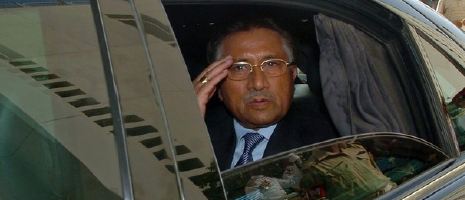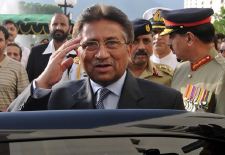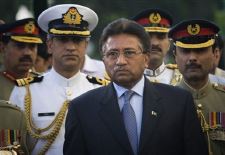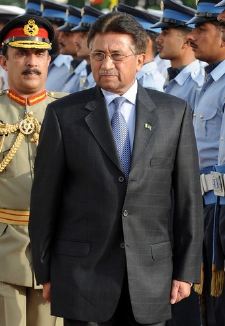Adil Najam
In a nationally televised speech, Gen. Pervez Musharraf, President of Pakistan, has just announced his resignation, pre-empting a move to impeach him by the parliament.
This post has been updated to add news photos from this momentous day in Pakistan’s political history. The pictures speak eloquently of the moods and thoughts of the day. (Scroll down to see the video of Gen. Musharraf’s resignation speech).
Participate in a poll on what might be Pakistan’s future post-Musharraf, here.
![]()
Here is a Pervez Musharraf time-line, published in The News:
August 1943: Born in Delhi, India
1964: Joins Pakistani army.
1998: Becomes army chief of staff.
October 1999: Seizes power in a bloodless military coup, overthrowing the prime minister, Nawaz Sharif. In response, the Commonwealth suspends Pakistan’s membership.
June 20 2001: Makes himself president, replacing Rafiq Tarar, while remaining head of the army. Tarar is forced out of office when the parliament that elected him is dissolved.
July 2001: Holds first meeting with the Indian prime minister, Atal Bihari Vajpayee, at Agra in India. No progress is made because of differences over the disputed territory of Kashmir.
September 2001: George Bush courts Musharraf, asking him to join him in his “war on terror” and help defeat the Taliban in neighbouring Afghanistan. The US president promises Pakistan $1bn in aid.
April 2002: Wins a referendum giving him another five years in office. Observers criticise the referendum as blighted by irregularities.
May 2002: Pakistan test fires three medium-range surface-to-surface missiles capable of carrying nuclear warheads. Musharraf insists his country would not be the one to initiate war.
August 2002: Consolidates his power still further, giving himself the right to dismiss an elected parliament.
October 2002: Pakistan’s first general election since Musharraf seized power in 1999 results in a hung parliament.
November 2002: Mir Zafarullah Jamali becomes the first civilian prime minister since 1999. He is a member of a Musharraf-supporting party.
November 2003: Pakistan’s National Assembly meets for the first time since 1999.
December 2003: Musharraf promises to step down as head of the army by January 2005.
May 2004: Pakistan is readmitted to the Commonwealth.
December 2004: Musharraf announces he will stay on as head of the army.
August 2005: Pakistan tests its first nuclear-capable cruise missile.
March 2007: Musharraf suspends the chief justice, Iftakar Mohammed Chaudhry, triggering a wave of anger across the country and the first joint protests held by the parties of exiled former prime ministers Benazir Bhutto and Nawaz Sharif.
October 2007: Signs a corruption amnesty, opening the way for Bhutto’s return and a possible power-sharing agreement. Within hours of Bhutto’s arrival back in the country, bombers attack a Bhutto rally in Karachi, killing more than 100 people.
November 2007: Declares a state of emergency, rounding up opposition leaders at gunpoint. In the same month, Musharraf quits as head of the army, becoming a civilian president.
December 15 2007: Lifts state of emergency and announces plans to go ahead with parliamentary elections scheduled for January 8.
December 27 2007: Benazir Bhutto is assassinated at an election rally in Rawalpindi.
January 2008: Elections postponed until February 18.
February 2008: The two main opposition parties gain a clear majority in the elections.
August 2008: The two main parties strike a deal to impeach Musharraf if parliament backs the move.
August 18 2008: Musharraf announces his resignation


























































When I first read the comments here I was appalled at how many anti-democracy and anti-Pakistan comments were here. My guess is that some of the ISI types whose job is to destroy Pakistan and support dictators were doing their propaganda here. But I guess its really a few frustrated people annoyed that the people of Pakistan have won out against their guy who are venting their frustrations here.
PAKISTAN ZINDABAD
DEMOCRACY ZINDABAD
I am a little surprised by the barrage of Musharraf supporters here and the logic they are deploying… no doubt Musharraf did several good things for the country- he was instrumental in undoing the straitjacket that his military predecessor… but does that he should have hung on to the presidential post with such tenacity when the will of the people dictated otherwise ? And those of my fellow countrymen who are abusing Asif Ali Zardari… and corrupt politicians… the reason why these politicians are not ousted yet is because we haven’t allowed the process to work. How long are we going to depend on knights in shining armor… this is a mirage anyway.
Democracies are chaotic… but in the long run they bring their own method to madness…. much better than an autocratic military dictator. India’s politicians are no better than ours… but their system has ensured their stability. Let us put our faith in the system.
Also… this wasn’t about Jamia Hafsa (Jamia Hafsa was a legal action by the Pakistani state which was taken after exhausting all options) or about Islam etc … this was about an unelected ruler going home. If Musharraf is a fighter… he should stay in Pakistan, make his own party (or the faction of the PML-Q still willing to follow him) and fight…
Amazing how people who support Musharraf can find nothing to say about how he was good…. all they have is this hatred for Zardari and Nawaz Sharif. Since Pakistanis have elected them it does not matter what a few ISI types believe, the will of the people is superior to everything.
The difference between former president and Gen(rtd) Musharraf and the two leaders of the political parties is that the former seemed loyal to this countries and led the country in what he percieved was right whereas the later are loyal not to the country but to the wealth they have stolen from this country (clearly evident from their body language).
I would rather have been ruled by a democratic dictator than despotic democrats